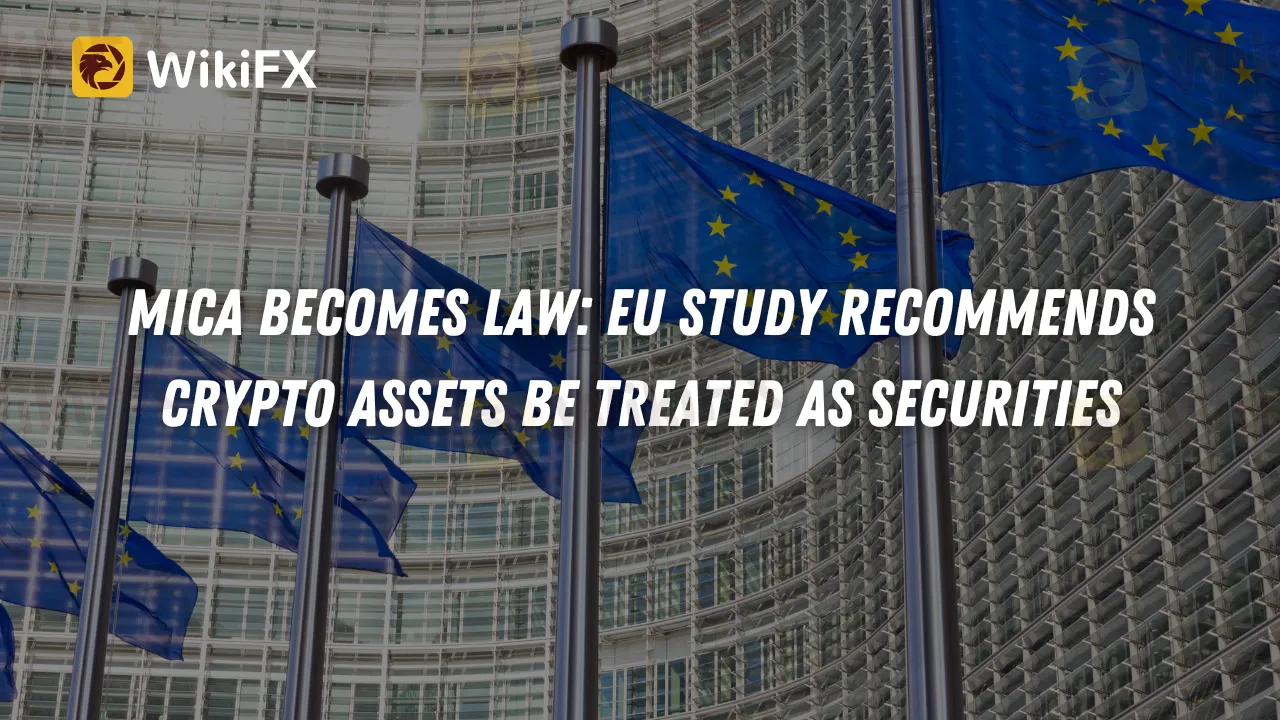简体中文
繁體中文
English
Pусский
日本語
ภาษาไทย
Tiếng Việt
Bahasa Indonesia
Español
हिन्दी
Filippiiniläinen
Français
Deutsch
Português
Türkçe
한국어
العربية
MiCA Becomes Law: EU Study Recommends Crypto Assets Be Treated as Securities
Abstract:The EU has enacted the MiCA regulations, recommending crypto assets be treated as securities. This major step towards crypto regulation could influence global crypto trading and rules.

The European Union (EU) has officially put its foot down on digital currency regulation by enacting the Markets in Crypto-Assets (MiCA) rules, providing a broad-based regulatory framework for the burgeoning crypto industry. The move is accompanied by a study commissioned by the EU Parliament suggesting that the default status of crypto assets should be that of securities, with any deviation from this rule requiring authorization from national authorities.
The completion of MiCA marks a significant step towards more rigorous regulation in the rapidly evolving world of crypto. The study commissioned by the EU Parliament emphasizes the default classification of crypto assets as securities, underscoring the regulatory challenges posed by the swift pace of advancements in the crypto sector and championing a more streamlined method of regulation.
The enforcement of these regulations provides some vindication for Gary Gensler, the Chair of the Securities and Exchange Commission (SEC) in the United States. Gensler, despite facing backlash from the crypto community, has consistently maintained that the majority of crypto tokens should be considered securities. The EU's enforcement of MiCA could potentially serve as a template for the United States to learn from and adapt to its regulatory landscape.
Moreover, U.S. SEC Commissioner Hester Peirce has interpreted the EU's enforcement of MiCA as an insightful learning opportunity for her country. As the regulatory environment for crypto assets continues to evolve and transform globally, authorities worldwide are keeping a vigilant eye on these changes, aiming to ascertain the most effective methods to safeguard investors and maintain market equilibrium.
In light of this advancement, the crypto industry has entered a critical juncture. The EU's MiCA guidelines, accompanied by the proposal to classify crypto assets as securities by default, set the stage for enhanced control and transparency in the digital currency market. This landmark development signals the possibility of a worldwide shift in crypto regulations, with potential implications for how digital currencies are traded and regulated across the globe.
As this new age of crypto regulation dawns, it's imperative for industry stakeholders and investors to stay abreast of the latest news and developments. Ensure you're in the loop by downloading the WikiFX App on your smartphone. Stay informed and navigate the dynamic crypto landscape with ease.
Download the App here: https://social1.onelink.me/QgET/px2b7i8n

Disclaimer:
The views in this article only represent the author's personal views, and do not constitute investment advice on this platform. This platform does not guarantee the accuracy, completeness and timeliness of the information in the article, and will not be liable for any loss caused by the use of or reliance on the information in the article.
Read more

CySEC Revokes UFX Broker Licence as Reliantco Halts Global Operations
The Cyprus Securities and Exchange Commission (CySEC) has officially withdrawn the Cyprus Investment Firm (CIF) licence of Reliantco Investment Limited, the operator of UFX.com. This decision followed a six-month period during which the company failed to provide any investment services or perform investment activities.

Elon Musk Sparks Debate Over Presidential Power and Federal Reserve Independence
Elon Musk has voiced his support for the controversial idea that United States presidents should have a role in shaping Federal Reserve policies. This endorsement aligns with recent remarks from President-elect Donald Trump, who has hinted at revisiting the central bank's independence, a long-held tradition in the nation's financial governance.

Crypto 101: Coins vs Tokens
For those new to the world of cryptocurrency, terms like "coin" and "token" may seem interchangeable. However, understanding the distinction between these two digital assets is crucial for navigating the crypto landscape. Both coins and tokens serve as integral components of blockchain ecosystems, yet they differ in their functionalities, use cases, and the technologies underpinning them.

WikiEXPO Global Expert Interview: The Future of Financial Regulation and Compliance
In the current era of booming financial technology, constantly evolving regulatory environment, and global construction of secure trading defenses, "Seeing Diversity, Trading Safely" - the theme of the WikiEXPO Dubai exhibition on November 27th accurately captures the core concerns of the industry.
WikiFX Broker
Latest News
Tokyo Police Arrest 4 for Unregistered FX Trading Scheme
BSP Shuts Down Uno Forex Over Serious AML Violations
ACY Securities Expands Global Footprint with South Africa Acquisition
Rupee gains against Euro
WikiEXPO Global Expert Interview: The Future of Financial Regulation and Compliance
DFSA Warns of Fake Loan Approval Scam Using Its Logo
Consob Sounds Alarm: WhatsApp & Telegram Users Vulnerable to Investment Scams
CySEC Revokes UFX Broker Licence as Reliantco Halts Global Operations
Axi Bids AUD 52M to Acquire Low-Cost Broker SelfWealth, Outbidding Competitor Bell Financial
Crypto Influencer's Body Found Months After Kidnapping
Currency Calculator


